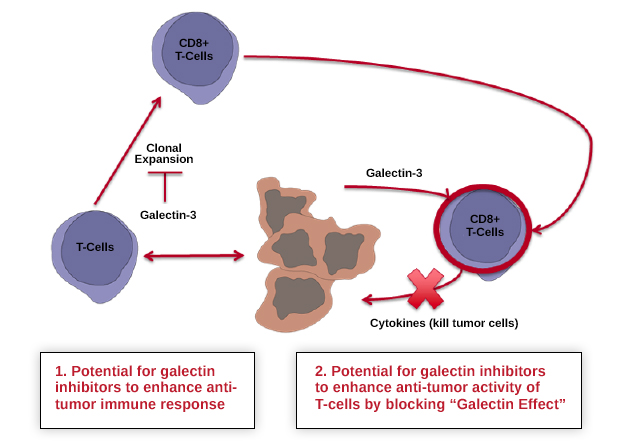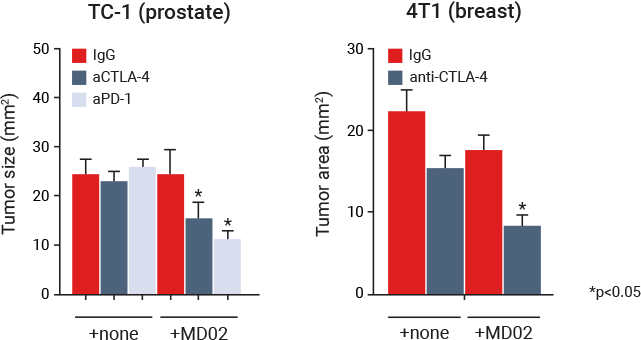The immune system consists of a complex set of cells that respond to molecules and organisms foreign to the body and are modulated by secreted cytokines and cell-cell interactions. Galectins have been shown to be important in the modulation of multiple immune cells, including macrophages and lymphocytes. Our Company is particularly interested in galectin modulation of the immune system in response to cancerous cells. We believe that galectins have important roles in the inhibition of immune cells by the tumor cells and the response of the immune system to “foreign antigens” on cancer cells.
We believe there is potential for galectin inhibition to play a key role in the burgeoning area of cancer immunotherapy. For example, there have been two recent approvals of drugs that enhance a patient’s immune system to fight cancer: Provenge® (Dendreon; a dendritic cell tumor vaccine) and Yervoy® (BMC; a monoclonal inhibitor of CTLA4 which activates cytotoxic T-cells). With many additional vaccines and immune stimulatory agents in development, industry analysts forecast that this market could grow to over $7 billion by 2015. It is our goal to use a galectin inhibitor to enhance the immune system function to fight cancer and, most important, that complements other approaches to this type of therapy. Our drug candidates provide a promising new therapeutic approach to enhance the activity of the immune system against cancer cells.
Galectin Therapeutics is working with Providence Portland Medical Center in planning for a Phase 1 clinical trial to evaluate the combination of Bristol-Myers Squibb’s Yervoy® (ipilimumab) and the Company’s GR-MD-02 in patients with metastatic melanoma. This trial is based on pre-clinical data obtained in collaboration with Dr. Will Redmond at the center which demonstrated that the combination of immune checkpoint inhibitors like ipilimumab with GR-MD-02 enhances the antitumor effect in syngeneic mouse cancer models.
Our drug candidates have shown promising data suggesting a new therapeutic approach to enhance the activity of the immune system against cancer cells. Galectins may inhibit the response of the immune system and protect cancer cells against immune attack, as depicted in the figure below:

There are data to suggest that inhibition of galectin-3 with our drugs will block these effects that hinder the immune system from killing tumor cells and, therefore will be useful in tumor immunotherapy.
These studies were led by Dr. Stefanie Linch in the laboratory of tumor immunology expert William L. Redmond, Ph.D. of the Providence Cancer Center’s Earle A. Chiles Research Institute and were presented at the Society for Immunotherapy of Cancer’s (SITC) 30th Anniversary Annual Meeting. The meeting was held November 4-8 in National Harbor, Maryland and the studies were conducted by the Institute in collaboration with Galectin Therapeutics.
The poster presentation was titled “Galectin-3 inhibition using novel inhibitor GR-MD-02 improves survival and immune function while reducing tumor vasculature” and an abstract was published in the Journal for ImmunoTherapy of Cancer. The study found that GR-MD-02 boosts the frequency and persistence of antigen-specific T cells in non-tumor bearing mice. Additionally, GR-MD-02 in combination with anti-OX40, a monoclonal antibody in clinical development that activates the immune system, improved survival, increased CD8 and CD4 tumor-infiltration lymphocytes, reduced lung metastases, and reduced tumor vasculature. These are all effects that might be predicted from inhibiting galectin-3 in the pathophysiology of cancers (see CEO perspective). View Poster Presentation.
These findings were followed up with experiments in tumor-bearing syngeneic mouse experiments using various immune modulatory drugs in combination with our galectin inhibitors. As shown in the figure below, the addition of GR-MD-02 to immunotherapy with anti-CTLA4 and anti-PD1 markedly enhanced anti-tumor activity in syngeneic mouse models of cancer.

The role of galectins in cancer immunotherapy can be understood through the “Galectin Effect,” a recent discovery of how tumors avoid the body’s own immune system. Dr. Pierre van der Bruggen (of the Ludwig Institute of Cancer Research in Brussels, Belgium) demonstrated that galectin-3, which is produced by the vast majority of human cancer cells, binds to and blocks the actions of tumor-infiltrating T-lymphocytes, the major immune cell in the body’s defense against cancers (Demotte 2008, Demotte 2010). Based on these results, we collaborated with Dr. van der Bruggen’s laboratory to evaluate the effect of GM-CT-01 on TIL cells, which was presented a Keystone Conference in February 2011 (“Is it possible to correct the impaired function of human tumor-infiltrating lymphocytes?”. These results show that GM-CT-01 block galectins and, in turn, restore the ability of the T-lymphocytes to kill tumor cells. It is important to note that these studies were performed using human tumors and their autologous tumor infiltrating lymphocytes. View poster presentation.
Learn about immunotherapy in our development program.
